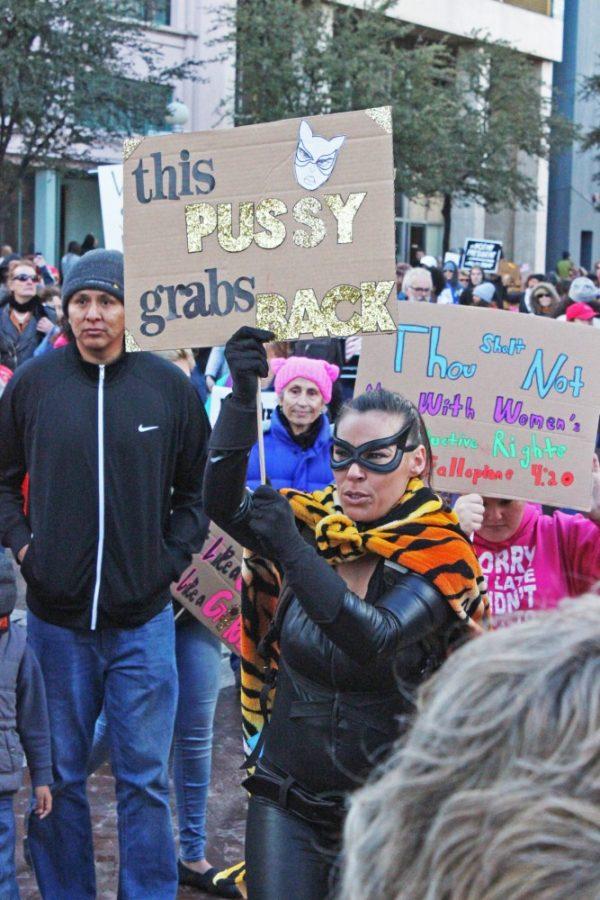March is Women’s History Month, bringing many events on campus, locally and nationally recognizing the struggle women have faced. Aurora Sartori, graduate assistant at UA’s Women’s Resource Center and Ph.D. student in language, reading and culture, said in a release on the WRC website that too often, women are left out of historical narratives.
“In the ‘official history’ we’re taught in school, women’s roles and experiences, especially those of women of color, are too often relegated to the margins, if they are mentioned at all,” Sartori wrote. “A footnote, a parenthetical reference, perhaps, but they are never the central narrative.”
Sartori wrote that this month is a time to shift perspective, “de-center the contributions of those who have been doled out a disproportionate amount of space in the annals of history—mostly heterosexual white men” and focus instead on the contributions and experiences of those who have been so consistently excluded.
California started the push for Women’s History Month in 1978, when the Education Task Force of the Sonoma County Commission on the Status of Women initiated a “Women’s History Week.”
RELATED: Tucson community turns out to march for women’s rights
The movement spread, and by 1980, President Jimmy Carter issued the first Presidential Proclamation declaring the week of March 8, 1980 as National Women’s History Week. By 1986, 14 states had declared March as Women’s History Month, and in 1987, Congress made March National Women’s History Month permanently.
This year, the WRC is showcasing “forgotten and unacknowledged contributions of women” on their Facebook page for the month of March. So far, they have spotlighted:
Ada Lovelace, considered the first computer programmer
Female athletes
Lucy Gonzalez Parsons, founder of Industrial Workers of the World, a labor organizer, a radical socialist and an anarchist
Graciela Gil Olivarez, who served in President Carter’s administration as Director of Community Services, making her the highest-ranking Mexican American woman in his administration
Campus events include talks and poetry readings. Friday, March 3 was ‘The 51 Year Diary of Irish Immigrant ‘Mim’ Walsh,’ a talk by diary scholar professor Judy Temple on the life of Mary Eileen “Mim” Walsh at the Arizona History Museum. Saturday, March 4 was ‘‘Po-eh-TREE’ Poetry Reading: Emily Dickinson’s ‘Gorgeous Nothings’ at the Campus Arboretum, put on by the UA Poetry Center.

Upcoming campus events are a lecture, “Queer Decolonial Femme Perspectives in the Américas” by Macarena Gómez-Barris at the Center for Creative Photography on Thursday, March 30, at 6:30 p.m. There’s also the monthly Censored Series on March 28 at 6:30 p.m. on the fourth floor of the Student Union Memorial Center, which will be a discussion on abortion and reproductive rights, and a body positivity fair on the UA Mall on March 22 starting at 9:30 a.m.
Sartori wrote this month is all about acknowledging and giving space to different experiences.
“Within the category of ‘women’ there is a glorious myriad of diversity,” Sartori said. “We hope that you’ll join us in the powerfully feminist act of recognizing the contributions of women who have been left out of history, reminding us that their achievements—winning a Nobel prize, writing a ground-breaking novel, governing a nation, raising a family, leading a social movement—are not dependent upon one’s gender identity.”
Off-campus local events include an exhibit by the Arizona Historical Society Library and Archives at the Arizona History Museum on archived Arizona womens’ papers and a luncheon by the UA Tech Park to celebrate the Tech Park’s women on Wednesday, March 29, from 11:30 a.m. to 1 p.m. at the Arizona Center for Innovation, Suite 1270, 9040 S. Rita Road.
The luncheon will include a panel discussion by Christina Orosco from IBM, Mary Darling from Darling Geomatics, Holly Griffin from N.P. Photonics and Molly Gilbert from Tech Parks Arizona, moderated by Kate Hoffman, founder and CEO of Earn to Learn.
RELATED: WRC groups plan, prepare for SlutWalk 2016
Also, the Beth Shalom Temple Center has a multi-media art presentation on display, created by the congregation’s women in honor of Women’s History Month. The presentation runs from March 1 to April 20 at the Beth Shalom Temple Center, 1751 N. Rio Mayo, Green Valley, and is free to view.
Another long-term event is a showcase of films by female directors at Exploded View Microcinema, at 197 E. Toole Ave., Tucson, every Wednesday in March starting at 7:30 p.m.
Nationally, USA Today is highlighting one historical woman per day on their website. The Library of Congress, National Archives and Records Administration, National Endowment for the Humanities, National Gallery of Art, National Park Service, Smithsonian Institution and United States Holocaust Memorial Museum are also “encouraging the study, observance and celebration of the vital role of women in American history” with events.
A lecture held March 2 called “The Glass Ceiling, Broken or Cracked?” featured a bipartisan group of former congresswomen who talked about their career paths, challenges they encountered along the way and the issues they still need to deal with today.
March 8 featured another lecture, “Soundwaves of Feminism: The Women’s Music Movement,” where Bonnie Morris discussed the grassroots feminist and lesbian music recordings and concerts of the 1970s, ’80s and ’90s.
International Women’s Day was March 8 this year and featured many marches to showcase “A Day Without a Woman,” showing how important women are in our society.
The Library of Congress has one more upcoming event listed, the March 22 “In Conversation with the Librarian of Congress: Leaders in the Arts” lecture. All of the previous events were available via YouTube.
Follow Marissa Heffernan on Twitter.








